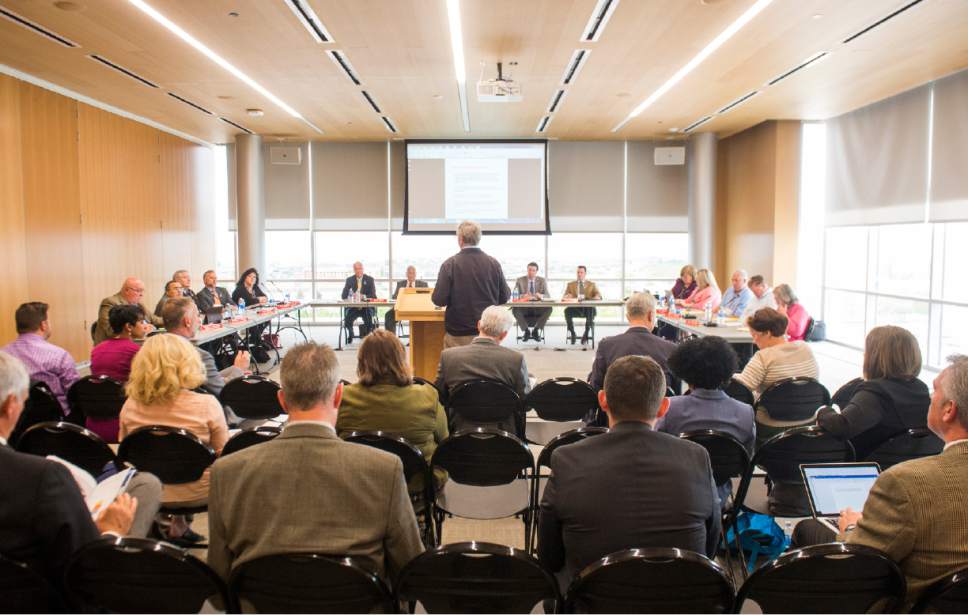This is an archived article that was published on sltrib.com in 2016, and information in the article may be outdated. It is provided only for personal research purposes and may not be reprinted.
After avoiding committee meetings for five months amid controversy about whether to open them to the public, the Utah Transit Authority's board held a marathon five-hour, committee-of-the-whole session Wednesday to catch up on some deferred topics.
That included a four-hour discussion with a consultant about how to improve its credibility and transparency.
It also reviewed next year's budget, hearing that fare revenues likely will drop because cheap gas is leading more people to drive their cars.
Amid recent criticism for attempts to have its committees always meet behind closed doors, the board brought in Sue Radwan, a Michigan-based consultant specializing in helping boards improve how they govern.
She told the board that bad press "is an indication that you as a board may not be paying attention" to what concerns the public.
Instead of being bitten by the media watchdog over UTA problems, "You might want to be a watchdog yourself," she advised.
Radwan added, "You need a culture of transparency" to create trust. But board Chairman Robert McKinley said some board members may hesitate to speak forthrightly in open meetings because they have been misquoted or quoted accurately out of context.
Former Board Chairman H. David Burton previously said one reason the board attempted to close its committee meetings permanently, with no votes taken, was to encourage more open discussion.
New board member Greg Bell, a former Utah lieutenant governor, said the board has an obligation to speak up in the open about its actions.
He said he's learned in his years of politics that it is possible to operate with confidence in the public fishbowl.
"It takes some restraint," Bell said, "and editing your language in advance."
He urged members not to let worries about media coverage drive them to hold discussions outside the public's view.
Critics have said UTA has done just that. Since it vowed under pressure in May that all its committee meetings would be public, it simply avoided holding them until Wednesday — except a few by its executive committee.
Also, board member Charles Henderson said last month that members of one committee held a conference call without public notice. He initially said the committee had been disbanded, so former members meeting that way did not violate vows for openness.
Henderson later told the Salt Lake County Council that he misspoke, and that only he and two other UTA board members were actually on that conference call — so it involved no quorum of any committee and had not been subject to open meeting laws.
Radwan urged the board to work with the public and media to define what true transparency should be.
She also said that continuing with committees may be unwise — not because of concerns over transparency, but because they work against having the board unity by creating a few experts in different areas.
Meanwhile, the board discussed next year's budget and heard that fare revenues are expected to drop by $300,000, or 0.6 percent, because inexpensive gasoline is leading more people to drive their own cars.
"As long as fuel stays really cheap and the economy is rebounding, there will be more passenger vehicles on the road," said Jerry Benson, president and CEO of UTA.
UTA also proposes borrowing another $15 million through bonding next year, at a time when 27 percent of its total revenue already goes toward debt service to pay off past bonds.
"It's sobering to know that we're going to spend more money on debt service than bus service for the next several years," Benson told the board. "But we went into this with our eyes open" when it borrowed heavily to expand its TRAX and FrontRunner rail systems in recent years.
The additional borrowing in 2017 had been planned for years, Benson said, and would fund such things as overhauling some of its aging TRAX vehicles, and to help install federally required "positive train control" systems to automatically help trains avoid collisions.
UTA officials proposed a $384.2 million operating budget for 2017, up 2.2 percent from this year. The lion's share, $249.4 million, would come from sales tax. That is four times more than the $58.7 million projected to come from rider fares.
The budget includes $90.7 million for bus operations, up 3.9 percent; $27.7 million for FrontRunner operations, which is actually a decrease of 14.5 percent; and a 12 percent increase for TRAX, up to $48.5 million.



